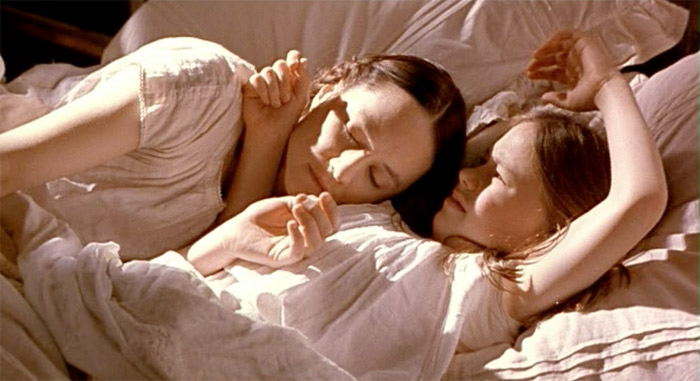 The Piano contains many stories. It is a love story between two outsiders: a mute woman, and an uneducated man. It is an allegory about oppression: a white landowner in New Zealand treats his wife and the Maori people like children or property. It is a study of conflicted characters: a repressed, oppressive landowner; his passionate, mute wife; the lower class man who falls in love with her; and her wild, intelligent daughter. It is a warning about the hazards of refusing to listen: a failed marriage, a soured initial seduction, and the climax of the film are all spurred by lacking communication. The Piano also has its roots in the fairy tale “Bluebeard;” a sinister story about a newlywed who discovers that her husband murders his wives. But as we’ve seen, Jane Campion doesn’t do easy fairy tale morality.
The Piano contains many stories. It is a love story between two outsiders: a mute woman, and an uneducated man. It is an allegory about oppression: a white landowner in New Zealand treats his wife and the Maori people like children or property. It is a study of conflicted characters: a repressed, oppressive landowner; his passionate, mute wife; the lower class man who falls in love with her; and her wild, intelligent daughter. It is a warning about the hazards of refusing to listen: a failed marriage, a soured initial seduction, and the climax of the film are all spurred by lacking communication. The Piano also has its roots in the fairy tale “Bluebeard;” a sinister story about a newlywed who discovers that her husband murders his wives. But as we’ve seen, Jane Campion doesn’t do easy fairy tale morality.
Campion’s story opens with the only words we will hear its main character speak:
The voice you hear is not my speaking voice - but my mind's voice. I have not spoken since I was six years old. No one knows why - not even me...
Ada (Holly Hunter) is a mute Scottish woman shipped to Victorian New Zealand to marry a stranger, Alisdair (Sam Neill). Ada carries with her the two possessions that make up her voice: her headstrong daughter (Anna Paquin), and her piano. Alisdair leaves the piano, to Ada’s dismay, but a former whaler named George (Harvey Keitel) senses the piano’s importance, and shelters it in his house. He uses it to start an affair with Ada. Considering that this is a story set in the Victorian era, it is a welcome surprise that Campion refuses to make Ada a victim of anything (except maybe circumstance). But that initial image, the piano on the beach, lingers. The incongruous image of a piano on a beach sets the theme for the film - melancholy, and tinged with magical realism.

The Piano brings all of Campion’s visual talents to bear. She and cinematographer Stuart Dryburgh tinge New Zealand’s verdant forests with blue mists, in contrast with the warm oranges of safe interior spaces. Stylistically, The Piano is a continuation of the lessons in restraint that Campion learned from An Angel at my Table - Campion uses the camera to observe action, rather than intrude upon it. Instead, she relies on powerfully stage visuals - many to do with the piano itself - to create a dreamlike world of images.
Contrasting with this eerie dreamlike cinematography is the very real performances. Holly Hunter plays Ada with stone-faced stubbornness and theatrical intensity that conveys everything Ada feels without speaking a syllable. Equally impressive is Flora, Ada’s daughter, who speaks with her mother in hand signs and lies as often as she tells the truth. At TFE, we’ve talked before about the difficulty in figuring out where a child’s performance ends and a good director begins, but whatever the case, Flora remains as emotionally complex and stubborn as her mother. This is the best acted film of Campion’s career so far.

Campion’s efforts were immediately recognized. She won the Palme d’Or, tying with Kaige Chen’s film Farewell My Concubine. Campion then became the second female director nominated for an Academy Award when The Piano was nominated for eight Oscars. (Only one of the film’s nominees - cinematographer Stuart Dryburgh - was a man.) The film won three total: Best Actress (Holly Hunter), Best Supporting Actress (Anna Paquin), and Best Screenplay (Jane Campion). Best Director and Best Picture went to Steven Spielberg’s sentimental juggernaut Schindler’s List. Still, the fact that Jane Campion’s emotional, unsentimental indie could hold its own critically in a year that included films by Robert Altman, and Martin Scorsese shows how powerfully received The Piano was. Jane Campion's next films would not fare so well.

Coming Soon on Women's Pictures:
 4/23 - In The Cut (2004) - This film has been requested on all forms of social media AND in the comments section! It was described alternately as Jane Campion's Best and Jane Campion's Worst. We're not ones to turn away from a controversial film. Especially not one starring Meg Ryan and Mark Ruffalo. (Amazon Instant Video)
4/23 - In The Cut (2004) - This film has been requested on all forms of social media AND in the comments section! It was described alternately as Jane Campion's Best and Jane Campion's Worst. We're not ones to turn away from a controversial film. Especially not one starring Meg Ryan and Mark Ruffalo. (Amazon Instant Video)
4/30 - Bright Star (2009) - Join us for the Hit Me With Your Best Shot crossover with Campion's latest feature about poet John Keates. This is going to be a tough one to choose just one shot for. (Amazon Instant Video)